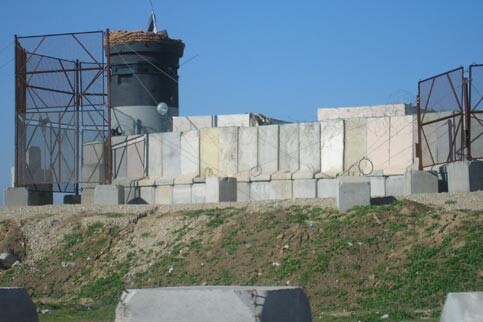Palestinian Center for Human Rights 21 August 2005

Israeli forces have continued to close al Matahen and Abu Houli checkpoints on Salah al Din Street during the day. The checkpoints separate the southern Gaza Strip and control movement along Salah al Din Street, the main north-south road in the Strip. (Arjan El Fassed)
Location: Southern Gaza Strip: al Mawasi, a sealed Palestinian enclave inside the “Gush Katif” settlement bloc. Central Gaza Strip: Abu Houli Military Checkpoint.
Chronology of Events
Israeli settlers will be compensated by the Israeli government for the grave breaches of international humanitarian law for which they are responsible. Despite this settlers used their own children as human shields during the process of being removed from the some of the Palestinian lands which were confiscated in1947. Throughout this period, and in particular since the occupation of Palestine began in 1967, Palestinian civilians have continued to suffer as a result of the grave breaches of IHL by Israeli settlers and soldiers. The redeployment, or ‘disengagement’, process has ensured that this suffering has continued.
Palestinian civilians remain subjugated to intense sieges of their communities across the OPT, including inside the Gaza Strip. Since the Intifada began the closure of the Gaza Strip has caused vast economic and social suffering, with civilians being deprived of a wide range of their basic human rights. The closures of areas such as al Mawasi continues to illustrate the drastic effect will continue to have on the Palestinian civilian population in the world’s largest prison.
Severe closure has been imposed at Abu Houli Checkpoint, the main checkpoint inside the Gaza Strip, operated by traffic lights controlled from Military Watchtowers which impose themselves on the surrounding landscape (this checkpoint is unlike many West Bank checkpoints at which many civilians are harassed by soldiers face to face). The checkpoint is named after the Abu Houli family whose agriculatural land was destroyed when the checkpoint was built. The family now provide shelter for travellers who get stuck overnight at the checkpoint to try and alleviate their suffering. It sits in the centre of the Gaza Strip and connects to al Matahen checkpoint. This massive checkpoint complex is designed to protect a road which only Israeli settlers can travel on leading in and out of the Gush Katif settlement bloc.
Closures and Curfews
Israeli Occupation Forces (IOF) are enforcing exceptionally stringent closure conditions in al Mawasi since they began implementing the disengagement plan. This included the closure of al Tuffah and Tal al Sultan checkpoints, the only link between al Mawasi and the rest of the Gaza Strip.
The closure took its heaviest toll on the agricultural sector, as farmers are barred from selling their produce. Farmers are complaining that the guava produce is falling from trees and rotting on the ground. The beleaguered farmers are suffering heavy losses during one of the year’s key production seasons.
The Directorate of Agriculture in Khan Younis indicates that the daily guava production in al Mawasi ranges from 6-10 tons. As a result farmers are suffering a direct loss of 30000-50000 New Israeli Shekels daily (approximately US$6,687). The 6000 Palestinian civilians inside al Mawasi live on an average of on or below US$2 daily.
Prior to the al Aqsa Intifada, there were 2650 dunms of farmland producing guava in al Mawasi. However, this area was reduced to 1150 dunums (1000 square metres) due to IOF restrictions and bulldozing.
Furthermore, the effects of the recent tightening of the closure are not limited to the guava season, but extend to the rest of al Mawasi’s produce. The main source of income in al Mawasi is agriculture.
Abu Houli Checkpoint
IOF have continued to close al Matahen and Abu Houli checkpoints on Salah al Din Street during the day. The checkpoints separate the southern Gaza Strip and control movement along Salah al Din Street, the main north-south road in the Strip.
Israeli officials had earlier informed the Palestinian side that, during the disengagement, the checkpoints would remain closed during the day from Sunday – Thursday and would remain open throughout the day on Friday and Saturday.
However, on Friday the 19th of Aug 2005, IOF kept the checkpoints closed until the afternoon. They were opened only when the motorcade of Palestinian President Mahmoud Abbas passed through. The checkpoints remained open for a few hours before they were closed again. The checkpoint was reopened on Saturday morning and then closed on Sunday morning.
The closure of al Matahen and Abu Houli checkpoints affects the lives of Palestinians and prevents them, especially employees, from reaching their destinations. The closure has severe adverse effects on the economic, social and cultural rights of the population.
International Law
Settlements and settlers are illegal under international law. The Fourth Geneva Convention, the primary document governing the OPT, stipulates in Article 49 that the transfer of the population of the occupying power into the occupied territory is in breach of international law. The International Court of Justice confirmed in its 2004 judgment that settlements and settlement activity is illegal.
Freedom of movement is a right afforded to Palestinian civilians under the Fourth Geneva Convention as well as under established international treaties on human rights. Preventing free movement of people and goods interferes with the right to work, the right to health, the right to education, the right not to be held as a prisoner without a free and fair trial.
Related Links